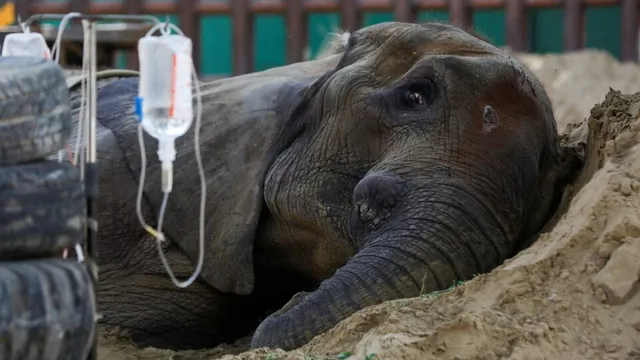- By Supratik Das
- Sat, 24 May 2025 02:23 PM (IST)
- Source:JND
The Karachi Safari Park has been at the centre of controversy for years regarding the neglect of its animals. But in a first and rare animal veterinary effort, Pakistan's Karachi Safari Park has introduced an innovative tuberculosis (TB) treatment programme for two African elephants, Madhubala and Malika, by giving more than 400 human pills a day. The treatment, initiated after a positive TB diagnosis, was done by a group of local and foreign veterinary specialists. The project represents one of the rare reported instances of treating elephants using the same medicine administered to humans affected by TB, a disease that infects more than 500,000 individuals in Pakistan annually.
Bitter Pills Used For Jumbo Treatment
The therapy, which was created by a team of Pakistani physicians and Sri Lankan elephant specialist Dr. Buddhika Bandara, consists of hiding TB tablets within foodstuffs such as apples, bananas, and Pakistani sweets. The elephant's huge weight of almost 4,000 kilograms per day is precisely calculated and equaled through the dosage. “Giving treatment for TB to elephants is always challenging. Each day we use different methods,” said Dr. Bandara, who has previously treated over a dozen elephants for TB in Sri Lanka. He noted the animals initially resisted the bitter medication, often spitting it out or reacting aggressively, but have since begun adapting.
Madhubala and Malika are two of four African elephants that were imported to Karachi from Tanzania in 2009 as calves. Their friends, Noor Jehan and Sonia, had expired in 2023 and 2024 respectively, and their post-mortem reports had isolated TB as the reason behind Sonia's death. After these fatalities, regular screening showed that Madhubala and Malika had also developed the disease, which was probably transmitted from humans. Both elephants remain asymptomatic despite their infection. Each morning, 22-year-old mahout Ali Baloch starts preparing the elephants' medicine by cooking rice and lentils in sugarcane molasses. The paste is turned into dozens of balls, with each one holding a few tablets. "I know the pills taste bitter," said Baloch, who, along with three other mahouts, also wears a mask and scrubs when feeding to prevent infection. "But this is helping save their lives."
Medical Professionals Keep A Close Eye
Indus Hospital and Health Network Head of Infectious Diseases Dr. Naseem Salahuddin is coordinating the medical response. "I was surprised to know that elephants have TB," she told NBC News. "This case is an eye-opener for my students and medical professionals." The progress of the procedure is being carefully monitored as part of a continuing research project on zoonotic diseases and cross-species infection, she said.

